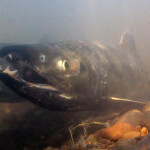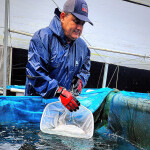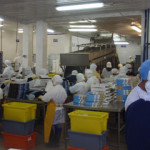Sustainable tilapia production in China and Fair Trade-certified shrimp in Mexico were among the Sustainable Fisheries Partnerships’ (SFP) top accomplishments last year, according to the organization’s 2016 Annual Report.
A landmark tilapia aquaculture improvement project (AIP) in Hainan, China, has broken new ground for the organization as well as industry stakeholders, and emerged as an even stronger world-leading initiative in 2016, SFP said in its report.
“This AIP is the best example of a zonal AIP in the world and also one that has strongly transitioned from SFP to industry-led, with support of a local NGO (China Blue), an international buyer (Fishin’ Co.), and many key local industry leaders,” said Anton Immink, SFP’s aquaculture director.
The project began in 2011, as SFP worked with producers in Hainan to find ways to make their operations more sustainable. In 2015, the first version of the project’s Code of Good Practices (CoGP) for Hainan Tilapia Farming was released – currently, 35 pilot farms are in the process of adopting the code.
Another major SFP accomplishment in 2016 was the announcement that a shrimp fishery based in Sinaloa, Mexico, had earned certification from Fair Trade USA. Since 2009, SFP had been working with California-based Del Pacifico Seafoods on the certification endeavor for the artisanal Sinaloa shrimp fishery, which generates annual landings of 2 million pounds with a value of USD 14 million (EUR 12.1 million), the organization said.
“SFP helped industry prepare for this important milestone, but Del Pacifico and its supplier MHMR International showed true leadership in supporting the fishermen to make the improvements and plans necessary for Fair Trade certification,” said Juan Manuel Caudillo, SFP’s deputy fisheries director. “We hope this serves as a model that spreads to other shrimp fisheries in the world and other fisheries in Mexico.”
SFP also played an important part in mediating discussions last year between importers of Mexican grouper on how their respective fishery could be improved, it recalled in the report. The dialogue led to SFP’s recommendation of commissioning a bioeconomic model for fishery improvement, scheduled for implementation in 2017.
Progress is being made on SFP’s “Target 75” initiative, the organization noted regarding promising projects now in the works. Announced earlier in 2017, the goal for the unfolding initiative is to see 75 percent or more of the world’s seafood either produced sustainably or making progress toward sustainability by 2020.
“SFP has a simple aim: Get as much of the world’s seafood production into effective fishery and aquaculture improvement projects (FIPs and AIPs) as quickly as possible,” said Jim Cannon, SFP’s Founder and CEO, in the report. “In 2016, we focused on supply chain roundtables (SRs) as the best way to achieve that goal. Major international suppliers with long-term commercial relationships with local seafood producers are best placed to make the business case to local producers for why they should lead FIPs and AIPs and become sustainable.”
SFP’s partners for the project include Aldi, The Cooperative Group, Beaver Street Fisheries, US Foods, Super Indo, Alcampo, and several other suppliers, retailers and organizations involved in the seafood industry.






